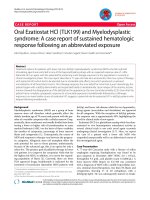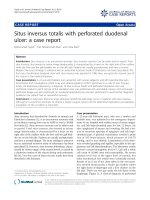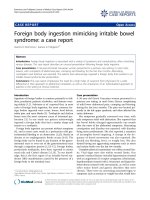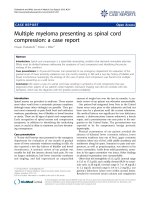Báo cáo y học: "Oral mite anaphylaxis by Thyreophagus entomophagus in a child: a case report" pptx
Bạn đang xem bản rút gọn của tài liệu. Xem và tải ngay bản đầy đủ của tài liệu tại đây (228.37 KB, 3 trang )
BioMed Central
Page 1 of 3
(page number not for citation purposes)
Clinical and Molecular Allergy
Open Access
Case Report
Oral mite anaphylaxis by Thyreophagus entomophagus in a child: a
case report
Javier Iglesias-Souto
1
, Inmaculada Sánchez-Machín
1
, Víctor Iraola
2
,
Paloma Poza
1
, Ruperto González
1
and Víctor Matheu*
1,3,4
Address:
1
Consulta de Alergia Infantil, Allergy Service, Hospital Universitario NS Candelaria, S/C Tenerife, Spain,
2
LETI, S.L., R & D Department,
Madrid, Spain,
3
Unidad de Investigación, Hospital Universitario NS Candelaria, S/C Tenerife, Spain and
4
Department of Clinical Sciences-Division
IV, Lund University, Sweden
Email: Javier Iglesias-Souto - ; Inmaculada Sánchez-Machín - ;
Víctor Iraola - ; Paloma Poza - ; Ruperto González - ;
Víctor Matheu* -
* Corresponding author
Abstract
Sensitization to Thyreophagus entomophagus, a storage mite, is uncommon and might produce
occupational respiratory disorders in farmers. We present the first case of a child suffering
anaphylaxis produced by ingestion of contaminated flour with Thyreophagus entomophagus.
Thyreophagus entomophagus is a storage mite, usually sited
in farms [1], but not in house dust of households [2]. Sen-
sitization to mite species might produce occupational res-
piratory disorders in farmers [1,3]. However, it is unusual
to live in urban houses or to produce symptoms by inges-
tion and there is no any report of child affected.
We encountered a 13-year-old boy suffering wheals, itch-
ing and diffuse erythema, cough and wheeze immediately
after ingest a home-made crêpe, prepared at home with
wheat flour, which was stored in kitchen for weeks. He
was treated at the Emergency Department with intrave-
nous fluids, diphenhydramine, epinephrine, and methyl-
prednisolone, with complete symptom resolution in 2
hours. He had a previous history of mild persistent aller-
gic rhinoconjunctivitis and sensitization to house dust
mite and facial angioedema, urticaria and bronchospasm
after Ibuprofen, but not any history about food allergy.
Skin prick tests (SPT) to common inhalant allergens were
positive to Dermatophagoides pteronyssinus, Dermatopha-
goides farinae or Blomia tropicalis and negative to the
remainder inhalants and foodstuffs including wheat flour.
Acoustic Rhinometry showed reversible mild obstruction.
Forced spirometry showed a mild obstructive pattern with
values -FVC: 3.98 (97%), FEV
1
2.78 (79%), MEF 50% 2.22
(49%), FEF 25-75%: 1.93 (45%) Bronchodilator test
showed a positive response with an improvement of FEV
1
post 3.17 (+13%). After written informed consent signed
by patient and his mother, open oral challenge (OOC)
with different foodstuffs were performed. OOC with
wheat and a commercial crêpe were good tolerated. Since
patient's mother brought us the culprit flour, microscopic
examination was performed and revealed mite contami-
nation by Thyreophagus entomophagus (104 mites/gram).
New SPT were done showing positive reactions with Chey-
letus spp. and a protein extract of Thyreophagus entomopha-
gus (Leti, Madrid, Spain). SPT to other storage mites were
negative. Specific IgE against the extract of Thyreophagus
entomophagus was also demonstrated in vitro by direct spe-
cific enzyme-immune-assay (Optical Density: 0.904; Con-
trol: 0.05) and by InmunoCAP (UniCAP, Phadia): 15,2
Published: 25 November 2009
Clinical and Molecular Allergy 2009, 7:10 doi:10.1186/1476-7961-7-10
Received: 20 October 2009
Accepted: 25 November 2009
This article is available from: />© 2009 Iglesias-Souto et al; licensee BioMed Central Ltd.
This is an Open Access article distributed under the terms of the Creative Commons Attribution License ( />),
which permits unrestricted use, distribution, and reproduction in any medium, provided the original work is properly cited.
Clinical and Molecular Allergy 2009, 7:10 />Page 2 of 3
(page number not for citation purposes)
kU/L. Immunoblot also demonstrated IgE reactivity (fig-
ure 1).
After a new written informed consent signed by patient
and his mother, specific nasal provocation test was done
showing positive symptoms score after instilled Thyre-
ophagus entomophagus (dilution 1/10 w/v) with a drop of
30% in the minimal cross-sectional area by Acoustic Rhi-
nometry (figure 2). Finally, after a new informed consent
an open oral challenge with aspirin was done. The OOC
was positive with peri-orbital angioedema.
Hidden allergens [4] in allergic individuals are still a big
issue [5]. Among others, hidden live organisms inside
foodstuffs can provoke episodes of anaphylaxis in sensi-
tized patients [6]. Matsumoto et al described the first case
of oral mite anaphylaxis (OMA) after eating storage-mite-
contaminated food by a mite [7]. Further, some other
groups have reported symptoms of asthma [8] or OMA
[9,10] by mite-contaminated foodstuffs. Several species of
mites, such as Dermatophagoides pteronyssinus, Dermatopha-
goides farinae or Blomia tropicalis have been linked with the
OMA [9,11,12], so called Pancake syndrome. However,
Thyreophagus entomophagus has been only reported by
Blanco et al [9]. This is the first report of anaphylaxis by
Thyreophagus entomophagus in a child. Furthermore, it is
the first time that a specific nasal provocation test with
Thyreophagus entomophagus has been performed.
In our patient, the culprit foodstuff was a, previously
cooked, home-made crêpe, This is in line of Sanchez-
Borges et al, who have concluded that anaphylaxis might
occur after the ingestion of heated or unheated mite-con-
taminated foods study [13]. In same study, authors
described 28 patients with anaphylaxis triggered by inges-
Immunoblot of patient' serum showing IgE reactivity against the storage mite Thyreophagus enterophagusFigure 1
Immunoblot of patient' serum showing IgE reactivity
against the storage mite Thyreophagus enterophagus.
Acoustic Rhinometry showing changes in minimal cross-sectional area after nasal provocation test with Thyreophagus enteropha-gusFigure 2
Acoustic Rhinometry showing changes in minimal cross-sectional area after nasal provocation test with Thyre-
ophagus enterophagus.
Publish with BioMed Central and every
scientist can read your work free of charge
"BioMed Central will be the most significant development for
disseminating the results of biomedical research in our lifetime."
Sir Paul Nurse, Cancer Research UK
Your research papers will be:
available free of charge to the entire biomedical community
peer reviewed and published immediately upon acceptance
cited in PubMed and archived on PubMed Central
yours — you keep the copyright
Submit your manuscript here:
/>BioMedcentral
Clinical and Molecular Allergy 2009, 7:10 />Page 3 of 3
(page number not for citation purposes)
tion of wheat-containing foodstuffs, and concluded that
OMA might be more prevalent in tropical and subtropical
countries than previously recognized [13].
Surprisingly, our patient had also clinical history of non-
steroidal anti-inflammatory drug (NSAID) hypersensitiv-
ity, which is uncommon in children. Some authors
pointed out the possible link of OMA with and NSAID
hypersensitivity [9,14,15]. Furthermore, some other
authors have hypothesized about a subset of individuals
with a particular susceptibility for both OMA and NSAID
hypersensitivity. Same authors hypothesized saying that
drug hypersensitivity is coming first before than OMA
called as a new triad [16].
In paediatric population, there events are more uncom-
mon. Matsumoto and Satoh observed recently paediatric
patients with OMA in Japan [17]. Wen et al described a
paediatric case report of OMA in an 8-year-old Taiwanese,
who was also co-sensitized to several mites including Der-
matophagoides pteronyssinus, Dermatophagoides farinae or
Blomia tropicalis. Sanchez-Borges also described a paediat-
ric patient developed OMA [10]. As we describe above, we
present the first report of anaphylaxis by Thyreophagus
entomophagus in a child with previous sensitization to
other mites. However, it is currently unknown the cross-
reactivity with other mites. More and bigger studies are
needed to search this possible cross-reactivity. Using fresh
new flour bags could prevent these types of events in sen-
sitized children. Mite growing should be avoided with this
simple procedure of using new bags. Alternatively, previ-
ously opened bags should be transfer to plastic bags and
stored inside refrigerator to avoid high humidity and tem-
perature, optimal conditions for mite growing [3].
Competing interests
The authors declare that they have no competing interests.
Authors' contributions
JI-S studied the case report and wrote the initial draft of
the manuscript. IS-M conceived the idea and is responsi-
ble for in vivo tests. PP was responsible for the Food
Allergy Section and studied the case; VI performed in vitro
studies. RG is responsible for the nasal study; VM analysed
the data and wrote the final version of the manuscript. All
authors approved the final version of the manuscript.
Acknowledgements
Declaration of sources of funding: Víctor Matheu is recipient of a grant from
"Convenio Instituto de Salud Carlos III- Comunidad Autónoma de Canarias (Pro-
grama de Intensificación de la Actividad Investigadores Clínicos 2007-2008-
2009).
References
1. Franz JT, Masuch G, Musken H, Bergmann KC: Mite fauna of Ger-
man farms. Allergy 1997, 52:1233-1237.
2. Fernandez-Caldas E, Fox RW, Bucholtz GA, Trudeau WL, Ledford
DK, Lockey RF: House dust mite allergy in Florida. Mite survey
in households of mite-sensitive individuals in Tampa, Florida.
Allergy Proc 1990, 11:263-267.
3. Blanco C, Quiralte J, Castillo R, Ortega N, Alvarez M, Arteaga C, Bar-
ber D, Carrillo T: Anaphylaxis after ingestion of wheat flour
contaminated with mites. J Allergy Clin Immunol 1997, 99:308-313.
4. Matheu V, Zapatero L, Alcazar M, Martinez-Molero MI, Baeza ML:
IgE-mediated reaction to a banana-flavored drug additive. J
Allergy Clin Immunol 2000, 106(6):1202-1203.
5. Radcliffe M, Scadding G, Brown HM: Lupin flour anaphylaxis. Lan-
cet 2005, 365(9467):1360.
6. Alonso A, Daschner A, Moreno-Ancillo A: Anaphylaxis with Ani-
sakis simplex in the gastric mucosa. N Engl J Med 1997,
337(5):350-351.
7. Matsumoto T, Hisano T, Hamaguchi M, Miike T: Systemic anaphy-
laxis after eating storage-mite-contaminated food. Int Arch
Allergy Immunol 1996, 109(2):197-200.
8. Blanco C, Castillo R, Ortega N, Alvarez M, Arteaga C, Barber D, Car-
rillo T: Asthma due to the ingestion of contaminated flour. J
Investig Allergol Clin Immunol 1997, 7(5):323-324.
9. Blanco C, Quiralte J, Castillo R, Delgado J, Arteaga C, Barber D, Car-
rillo T: Anaphylaxis after ingestion of wheat flour contami-
nated with mites. J Allergy Clin Immunol 1997, 99(3):308-313.
10. Sanchez-Borges M, Capriles-Hulett A, Caballero-Fonesca F: Oral
mite anaphylaxis (pancake syndrome) also observed in chil-
dren. Ann Allergy Asthma Immunol 2006, 96(5):755-756.
11. Hannaway PJ, Miller JD: The pancake syndrome (oral mite ana-
phylaxis) by ingestion and inhalation in a 52-year-old woman
in the northeastern United States. Ann Allergy Asthma Immunol
2008, 100(4):397-398.
12. Wen DC, Shyur SD, Ho CM, Chiang YC, Huang LH, Lin MT, Yang HC,
Liang PH: Systemic anaphylaxis after the ingestion of pancake
contaminated with the storage mite Blomia freemani. Ann
Allergy Asthma Immunol 2005, 95(6):612-614.
13. Sanchez-Borges M, Capriles-Hulett A, Fernandez-Caldas E, Suarez-
Chacon R, Caballero F, Castillo S, Sotillo E: Mite-contaminated
foods as a cause of anaphylaxis. J Allergy Clin Immunol 1997, 99(6
Pt 1):738-743.
14. Sanchez-Borges M, Capriles-Hulett A: Atopy and NSAID sensitiv-
ity. J Allergy Clin Immunol 1997, 100(1):143-144.
15. Sanchez-Borges M, Capriles-Hulett A, Caballero-Fonseca F: Addi-
tional information on the pancake syndrome. Ann Allergy
Asthma Immunol 2008, 101(2):221.
16. Sanchez-Borges M, Capriles-Hulett A, Capriles-Behrens E, Fernan-
dez-Caldas E: A new triad: sensitivity to aspirin, allergic rhini-
tis, and severe allergic reaction to ingested aeroallergens.
Cutis 1997, 59(6):311-314.
17. Matsumoto T, Satoh A: The occurrence of mite-containing
wheat flour. Pediatr Allergy Immunol 2004, 15(5):469-471.









